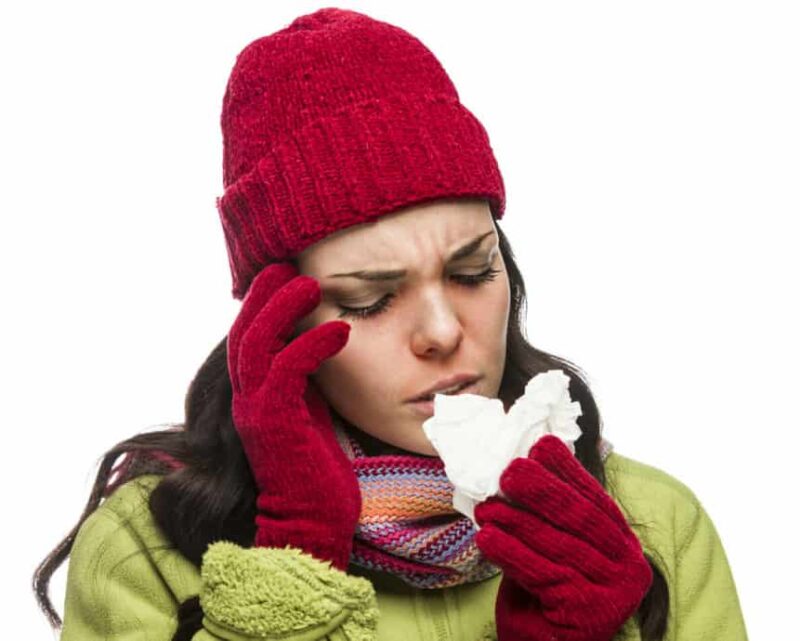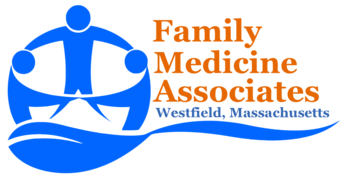
Both the Common Cold (Rhinovirus) and Flu (Influenza) share many of the same symptoms, especially when symptoms first appear. Generally, Cold symptoms are milder and develop more slowly than Flu symptoms, which can progress from mild to severe quite rapidly.
What Are The Common Cold Symptoms?
Cold symptoms often begin with the onset of sneezing, sore throat, or both. Symptoms often include runny nose, watery eyes, congestion, coughing… as well as a fatigue and overall feeling of being run down. Generally, a person who is showing symptoms of Cold/Rhinovirus is contagious , meaning he/she can pass the illness to other people. Assume that as long as you are exhibiting cold symptoms, you risk infecting other people who might come in contact with your bodily fluids. Your coughing and sneezing will also put a viral load into the air, which can infect healthy people as well.
How Long Does The Cold Last?
These symptoms generally last about a week1), to varying degrees, but the duration of the cold can be shorter or much longer depending on the overall health of the person. If the symptoms become progressively worse, or linger for more than a week, you could be developing a bacterial infection. When in doubt, call your doctor to discuss your concerns and possibly make an appointment to see your doctor as soon as possible. If your sore throat becomes extremely painful or lasts for more than a few days, you need to be checked for Strep Throat infection, which is a potentially dangerous condition if not treated quickly with antibiotics.
What Are The Common Flu Symptoms?
Flu symptoms usually come on more quickly than those of the Common Cold and are typically more severe. Whereas the first day or two of a Cold infection may bring sneezing, mildly or moderately sore throat, etc., the Flu may come on with body/muscle aches, pounding headache, fatigue and many more symptoms, which are often more severe than a Common Cold. Flu symptoms may progress quickly to fever, chills, nausea, and severe respiratory distress. Although The Flu is caused by several types of influenza viruses, Flu can lead to pneumonia in some people, which is a life-threatening illness requiring immediate medical treatment.
Still Not Sure?
| Symptom | Cold | Flu |
|---|---|---|
| Fever | Adults-uncommon; children- sometimes | High fever (100°F +; can last 3 or more days) |
| Runny/Stuffy nose | Common – Almost Always! | Sometimes |
| Sneezing | Common – Almost Always! | Sometimes |
| Headache | Sometimes (usually mild) | Common (can be severe) |
| Body aches | Sometimes (usually mild) | Common (can be severe) |
| Fatigue | Sometimes | Common (can last up to 2-3 weeks) |
| Exhaustion | Uncommon | Common (at the start of the flu) |
| Chills, sweat | Uncommon | Very Common |
| Nausea | Uncommon | Common |
| Loss of appetite | Sometimes | Common |
| Cough | Common | Common (can be painful & intense) |
| Sore throat | Very Common | Sometimes |
| Chest congestion, discomfort | Common (mild to moderate) | Common (can be painful & severe) |
| Watery eyes | Common | Sometimes |
When Should I See My Doctor?
Whether the Cold or Flu, it’s time to contact your doctor if you experience2):
- Fever that lasts more than a few days, or goes away, then comes back
- Persistent cough
- Blood in the phlegm
- Worsening congestion
- Painful sore throat
When Should I Go Straight To The ER?
- If you are too weak to stand
- Shortness of breath, difficulty breathing
- Breathing is painful
- Inability to think clearly, dizziness, confusion
- Slurred speech
- Change in fingernail color: bluish or white nail beds3)
Video Sources
“How to Know if You Have the Flu: Flu Symptoms”
Uploaded by: Centers for Disease Control and Prevention (CDC)
YouTube.com
“Flu Warning Signs That Need Medical Care Right Away”
Uploaded by: Centers for Disease Control and Prevention (CDC)
YouTube.com
Sources and References
| ↩1 | WebMD “Flu or Cold Symptoms?” http://www.webmd.com/cold-and-flu/cold-guide/flu-cold-symptoms#1 |
|---|---|
| ↩2 | WebMD “When Should I See a Doctor for a Cold or Flu?” http://www.webmd.com/cold-and-flu/cold-guide/when-see-doctor |
| ↩3 | Center for Disease Control and Prevention “The Flu: What To Do If You Get Sick” (CDC) https://www.cdc.gov/flu/takingcare.htm |
